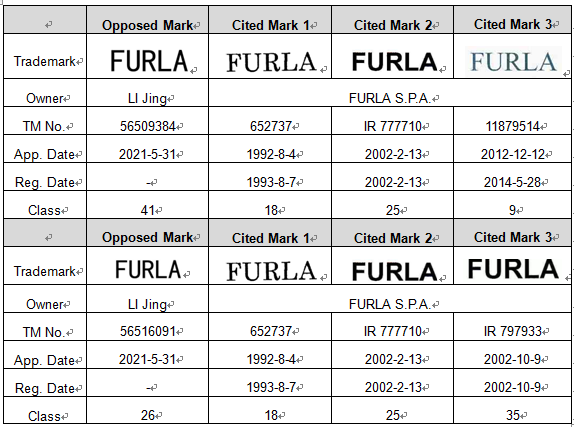Opposition Cases about Mark “FURLA” under TM Nos. 56509384 & 56516091
Backgrounds of Cases
Opponent: FURLA S.P.A.
Agent of Opponent: Kangxin Partners, P.C.
Opposed Party: LI Jing
Marks at issue:

Main grounds claimed by the opponent:
1) the opposed mark constitutes a “similar mark over similar goods/services” compared to the opponent’s Cited Mark, “FURLA”;
2) the opposed mark is a malicious copy of the opponent’s well-known trademark, namely Cited Mark; and
3) the opposed party filed the opposed mark in improper means, which violates the principle of good faith.
Official Decisions
After examination, the CNIPA holds that:
Considering that the designated goods/services of the opposed mark are obviously different from the goods designated by the opponent’s Cited Mark, “FURLA” in terms of functions and target consumers, they do not constitute “similar goods/services.” Therefore, the opposed mark and Cited Marks do not constitute “similar mark over similar goods/services.”
However, “FURLA” is not a common English word but possesses strong creativeness. In the subject cases, the opponent submitted abundant evidence, which could be able to prove that the opponent’s prior mark, “FURLA” has acquired a high reputation amongst the relevant public through long-term use and promotion.
Furthermore, after examination, the CNIPA ascertains that the opposed party has filed several marks, which are identical to others’ prior creative brands in various goods and services, for example, “FARFETCH,” but the opposed party did not give reasonable explanations on the creation and use intention. Hence, it can be determined that the opposed party takes advantage of the opponent's good reputation for illegal profits, which will mislead the relevant consumers over the source of the goods and services, seriously disturb the normal market order of fair competition, and violate the principle of good faith.
Pursuant to Articles 7, 30 and 35 of China Trademark Law, the CNIPA made the decisions that the opposed mark under App. Nos. 56509384 and 56516091 should be rejected for registration.
Inspiration of Cases
This is another successful case that the CNIPA cites Article 7 of China Trademark Law to reject a malicious filing, which will further help clarify the scope of protection of a trademark, prevent confusion and deception, protect the exclusive rights of a trademark, and create fair competition environment. This provision helps safeguard the legitimate rights and interests of trademark owners, promote the healthy development of trademarks, and maintain the stable operation of the market economy. In juridical practice, this is also a milestone for the CNIPA to utilize the discretion when cracking down the malicious filings, which will be much meaningful to attack others’ infringement or improper filings, and help the real holders to protect their own business as maximum as possible!